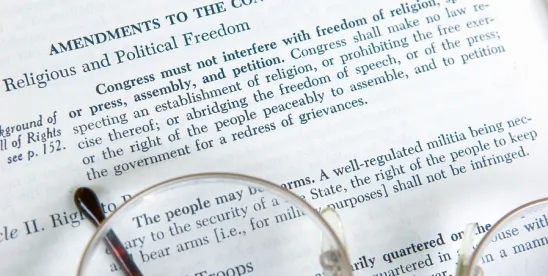The TCPA–famously the most expansive restriction on constitutionally-protected speech in our nations’ history--will soon have its day in court. It is not an overstatement to suggest that that day–April 22, 2020– may become a red letter date for all who love freedom.
At a high level, the TCPA prevents most automated calls to cell phones made without consent, but allows such calls about certain topics that the government favors. Such content-specific restrictions on speech run afoul of the First Amendment–the government does not get to pick and choose what speech it wants to make illegal--and are presumptively invalid.
Nonetheless two appellate courts reviewing the TCPA have recently held that the statute can survive constitutional review because the exemption for government-favored speech can be struck from the statute, converting the TCPA into a content-neutral statute subject to a lower degree of scrutiny. Setting aside that the TCPA probably cannot even survive a lower-level of constitutional scrutiny, the Supreme Court is set to review whether the First Amendment permits the government to favor its own speech and, if not, whether exemption is severable, if not, whether the TCPA can survive First Amendment review and, if not, what to do about it.
Fun.
Unpacking this a bit more–the government’s position is that the First Amendment does not apply to restrictions favoring its own speech.
Pause.
Think about that. The USA is literally arguing to SCOTUS that it can silence all private speakers and allow only the government to speak and the First Amendment has nothing to do with it.
Scary scary scary.
But assuming we leap the first hurdle for freedom–i.e. finding that the First Amendment does actually apply to government speech–there is a second hurdle. Can Congress just pass an unconstitutional restriction on speech using exemptions to carve out favored speech and watch disfavored speakers get caught in inescapable trap?
The government is arguing that even if the TCPA is unconstitutional, the remedy is simply to sever out an exemption and avoid review of the restriction that the petitioners are challenging in the first place.
Why is that so bad? Imagine a law that says it is illegal to wear a shirt in public, except if the shirt is a color other than purple. You get arrested for attending Kobe’s memorial in appropriate purple attire. You challenge the law as an unconstitutional content-specific restriction on speech. The government says–you’re right! Our bad. We can’t tell you what color to wear so we’ll just strike the part about purple shirts. Now the law reads it is illegal to wear a shirt in public. Period. Since you were still wearing a shirt you get to stay in jail.
Obviously this is a ridiculous result. Your challenge was not to the exception, but to the restriction. Your goal was to protect your own speech–not to bring other people down with you and have the law expanded. And striking a content-specific exemption to broaden a restriction on speech results in more speech being made illegal– the opposite of what the First Amendment commands. So severing an exemption in the context of a challenge to a speech restriction is antithetical to First Amendment protections.
It is plain as day, therefore, that the Supreme Court isn’t serving anything, as the Archduke already explained earlier this week. The “shirt doesn’t have to be purple” approach is not going to fly. So only one of two things can happen: i) the Supremes find that that the First Amendment does not apply where the government favors its own speech all; or ii) the Supremes will review the TCPA’s ATDS restrictions as a content-specific restriction on speech.
That’s it. Those are the only two options. And I am happy to be (the only one) on the record about it.
If SCOTUS determines that the government can make whatever restrictions it wants on speech and exempt itself from those restrictions well… there you have it. End of Free Speech. See you all in dystopia come July.
But assuming the First Amendment still stands at the end of this SCOTUS term, then the TCPA’s ATDS restrictions will have to survive strict scrutiny or get stuck down. That means–as we have already explained--that SOCTUS will have no choice but to adopt the Glasser/Gadelhak approach to ATDS interpretation in a bid to save the statute.
So there you go folks. Book your tickets. April 22, 2020 we get to see the fight in action. The outcome of this battle will see either the TCPA’s ATDS restrictions fall or our First Amendment protections evaporate. There are really no other outcomes here.
We’ll see you there.




 />i
/>i

